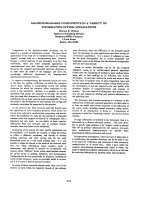Information system ralph CH06
Bạn đang xem bản rút gọn của tài liệu. Xem và tải ngay bản đầy đủ của tài liệu tại đây (1 MB, 56 trang )
Fundamentals of Information
Systems, Fifth Edition
Chapter 6
Information and Decision Support
Systems
Principles and Learning Objectives
• Good decision-making and problem solving skills
are the key to developing effective information and
decision support systems
– Define the stages of decision making
– Discuss the importance of implementation and
monitoring in problem solving
Fundamentals of Information Systems, Fifth Edition
2
Principles and Learning Objectives
(continued)
• The management information system (MIS) must
provide the right information to the right person in
the right format at the right time
– Explain the uses of MISs and describe their inputs
and outputs
– Discuss information systems in the functional areas
of business organizations
Fundamentals of Information Systems, Fifth Edition
3
Principles and Learning Objectives
(continued)
• Decision support systems (DSSs) are used when
problems are unstructured
– List and discuss important characteristics of DSSs
that give them the potential to be effective
management support tools
– Identify and describe the basic components of a
DSS
Fundamentals of Information Systems, Fifth Edition
4
Principles and Learning Objectives
(continued)
• Specialized support systems, such as group
support systems (GSSs) and executive support
systems (ESSs), use the overall approach of a
DSS in situations such as group and executive
decision making
– State the goals of a GSS and identify the
characteristics that distinguish it from a DSS
– Identify the fundamental uses of an ESS and list the
characteristics of such a system
Fundamentals of Information Systems, Fifth Edition
5
Decision Making and Problem Solving
• Strategic planning and the overall goals of the
organization
– Set the course for decision making, helping
employees and business units achieve their
objectives and goals
Fundamentals of Information Systems, Fifth Edition
6
Decision Making as a Component of
Problem Solving
• Decision-making phase
– Intelligence stage: identify and define potential
problems or opportunities
– Design stage: develop alternative solutions to the
problem
– Choice stage: select a course of action
Fundamentals of Information Systems, Fifth Edition
7
Fundamentals of Information Systems, Fifth Edition
8
Decision Making as a Component of
Problem Solving (continued)
• Problem solving
– Goes beyond decision making to include the
implementation stage
• Implementation stage
– Solution is put into effect
• Monitoring stage
– Decision makers evaluate the implementation
Fundamentals of Information Systems, Fifth Edition
9
Programmed Versus Nonprogrammed
Decisions
• Programmed decision
– Decision made using a rule, procedure, or
quantitative method
– Easy to computerize using traditional information
systems
• Nonprogrammed decisions
– Deals with unusual or exceptional situations
– Not easily quantifiable
Fundamentals of Information Systems, Fifth Edition
10
Optimization, Satisficing, and Heuristic
Approaches
• Optimization model
– Finds the best solution, usually the one that will best
help the organization meet its goals
• Satisficing model
– Find a good - but not necessarily the best - problem
solution
• Heuristics
– Commonly accepted guidelines or procedures that
usually find a good solution
Fundamentals of Information Systems, Fifth Edition
11
The Benefits of Information and
Decision Support Systems
• Performance of these systems
– Typically a function of decision quality and problem
complexity
• Decision quality can result in:
– Increased effectiveness
– Increased efficiency
– Higher productivity
Fundamentals of Information Systems, Fifth Edition
12
Fundamentals of Information Systems, Fifth Edition
13
An Overview of Management
Information Systems
• Management information system (MIS)
– Integrated collection of people, procedures,
databases, and devices
– Provides managers and decision makers with
information to help achieve organizational goals
– Can give companies a competitive advantage
Fundamentals of Information Systems, Fifth Edition
14
Management Information Systems in
Perspective
• MIS provides managers with information that
supports effective decision making and provides
feedback on daily operations
• Use of MISs spans all levels of management
Fundamentals of Information Systems, Fifth Edition
15
Fundamentals of Information Systems, Fifth Edition
16
Inputs to a Management Information
System
• Internal data sources
– TPSs and ERP systems and related databases
– Data warehouses and data marts
– Specific functional areas throughout the firm
• External data sources
– Customers, suppliers, competitors, and stockholders
whose data is not already captured by the TPS
– The Internet
– Extranets
Fundamentals of Information Systems, Fifth Edition
17
Outputs of a Management Information
System
• Scheduled reports
– Produced periodically, or on a schedule
• Key-indicator report
– Summary of previous day’s critical activities
• Demand reports
– Developed to give certain information upon request
• Exception reports
– Automatically produced when a situation is unusual or
requires management action
• Drill-down reports
– Provide increasingly detailed data about a situation
Fundamentals of Information Systems, Fifth Edition
18
Characteristics of a Management
Information System
• MISs perform the following functions
–
–
–
–
–
Provide reports with fixed and standard formats
Produce hard-copy and soft-copy reports
Use internal data stored in the computer system
Allow users to develop their own custom reports
Require user requests for reports developed by
systems personnel
Fundamentals of Information Systems, Fifth Edition
19
Functional Aspects of the MIS
• Most organizations are structured along functional
lines or areas
• MIS can be divided along functional lines to
produce reports tailored to individual functions
Fundamentals of Information Systems, Fifth Edition
20
Fundamentals of Information Systems, Fifth Edition
21
Financial Management Information
Systems
• Financial MIS
– Provides financial information
• Functions of a financial MIS
– Integrate financial and operational information from
multiple sources
– Provide easy access to data for both financial and
nonfinancial users
– Make financial data immediately available
– Analyze historical and current financial activity
Fundamentals of Information Systems, Fifth Edition
22
Fundamentals of Information Systems, Fifth Edition
23
Manufacturing Management
Information Systems
• Manufacturing MIS subsystems and outputs
– Monitor and control the flow of materials, products,
and services through the organization
• Common information subsystems and outputs used
in manufacturing
–
–
–
–
Design and engineering
Master production scheduling and inventory control
Process control
Quality control and testing
Fundamentals of Information Systems, Fifth Edition
24
Fundamentals of Information Systems, Fifth Edition
25









